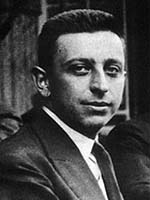Robert Desnos Biography
 Robert Desnos, the son of a café owner, was born on July 4, 1900, in Paris.
Robert Desnos, the son of a café owner, was born on July 4, 1900, in Paris.
He attended commercial college, and then worked as a clerk before becoming a literary columnist for the newspaper Paris-Soir.
He first published poems in the Dadaist magazine Littérature in 1919, and in 1922 he published his first book, Prose Selavy, a collection of surrealistic aphorisms. While on leave in Morocco from his mandatory two years in the French Army, Desnos befriended poet Andre Breton. Together with writers Louis Aragon and Paul Eluard, Breton and Desnos would form the vanguard of literary surrealism.
In the 1930s, Desnos diverged slightly from his Surrealist peers. Breton, in his Second Manifesto of Surrealism, 1930, would criticize Desnos for straying from the movement and for his journalistic work. In part, Desnos had simply grown tired of his own excessesboth in his creative and personal life. It was at this time that he married Youki Foujita and took on more commercial writing assignments for French radio and television.
In 1939 at the onset of World War II, Desnos again served in the French Army. During the German occupation, he returned to Paris and under pseudonyms such as Lucien Gallois and Pierre Andier, Desnos published a series of essays that subtly mocked the Nazis. These articles combined with his work for the French Resistance led to his arrest. Desnos was sent to first to Auschwitz, and then transferred to a concentration camp in Czechoslovakia. Although the Allies liberated this camp in 1945, Desnos had contracted typhoid. He died on June 8, 1945.
© 2007-2023 - All Rights Reserved
